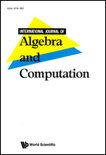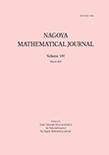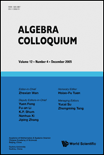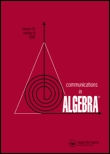
INTERNATIONAL JOURNAL OF ALGEBRA AND COMPUTATION
Scope & Guideline
Empowering Mathematicians with Cutting-Edge Research
Introduction
Aims and Scopes
- Algebraic Structures and Theories:
The journal focuses on various algebraic structures such as groups, rings, algebras, and modules, exploring their properties, classifications, and interrelations. - Computational Algebra:
It emphasizes the development and application of algorithms in algebra, including computational techniques for solving algebraic problems and implementing algebraic structures. - Geometric and Topological Aspects of Algebra:
Research on the geometric and topological implications of algebraic structures is a key area, including the study of algebraic groups, topological groups, and related geometric properties. - Applications of Algebra in Other Fields:
The journal also explores the application of algebraic methods in areas such as combinatorics, number theory, and physics, showcasing interdisciplinary research that utilizes algebraic frameworks. - Categorical and Homological Algebra:
Works on categorical approaches to algebra, homological dimensions, and derived categories are also featured, highlighting the connections between different algebraic theories.
Trending and Emerging
- Noncommutative Algebra:
There is a noticeable uptick in research focusing on noncommutative algebra structures, including noncommutative rings and algebras, reflecting a growing interest in their properties and applications. - Algebraic Topology and Homotopy Theory:
Emerging themes in algebraic topology and its interplay with algebra are becoming more prevalent, showcasing the increasing relevance of topological methods in algebraic contexts. - Combinatorial Algebra:
The rise of combinatorial techniques in algebra, particularly in the study of algebraic structures like semigroups and graph algebras, is a significant trend. - Computational Techniques in Algebra:
A surge in research applying computational techniques to solve algebraic problems, including algorithm design and computational complexity within algebraic frameworks, is evident. - Quantum Algebra and Noncommutative Geometry:
Research in quantum algebra and its connections to noncommutative geometry is gaining traction, reflecting broader interests in mathematical physics and its algebraic foundations.
Declining or Waning
- Classical Group Theory:
Research specifically focused on classical group theory and its foundational aspects has seen a decline, as the field shifts towards more computational and geometric approaches. - Elementary Number Theory:
The frequency of publications centered on elementary number theory within the journal has decreased, possibly due to the rise of more advanced algebraic methods and computational techniques. - Traditional Algebraic Geometry:
Interest in traditional algebraic geometry topics has waned, with researchers increasingly integrating computational methods or exploring connections with other fields.
Similar Journals

Cambridge Journal of Mathematics
Elevating Scholarship in the World of NumbersCambridge Journal of Mathematics, published by INT PRESS BOSTON, INC, is a premier platform for the dissemination of cutting-edge research in the field of mathematics. With an ISSN of 2168-0930 and E-ISSN 2168-0949, this journal stands out in a competitive academic landscape, currently ranked #58 out of 399 in General Mathematics, placing it in the top 15% within its category according to Scopus metrics. The journal serves as a vital resource for researchers, professionals, and students alike, aiming to foster groundbreaking mathematical inquiries and foster collaboration across disciplines. Published from 2020 to 2024, the Cambridge Journal of Mathematics is committed to maintaining high standards of scholarship, making it an essential read for those who are passionate about advancing mathematical knowledge and its applications.

Japanese Journal of Mathematics
Championing Quality Research in MathematicsThe Japanese Journal of Mathematics, published by SPRINGER, stands as a premier platform for the dissemination of high-quality research in the field of mathematics. With its ISSN 0289-2316 and E-ISSN 1861-3624, this prestigious journal has been continually contributing to the academic community since its inception. Spanning a broad range of mathematical disciplines, the journal enjoys a strong reputation, recognized in the 2023 category quartiles as Q1 in Mathematics (miscellaneous), placing it among the top-tier journals in the field. Its Scopus rank of #41 out of 399, which reflects an impressive 89th percentile, further underscores its influence and the quality of articles it publishes. The Japanese Journal of Mathematics is dedicated to fostering scholarly exchange and advancing mathematical research, making it an indispensable resource for researchers, professionals, and students alike. Although it does not offer open access, its comprehensive archives provide a wealth of knowledge for those seeking to deepen their understanding of mathematical theories and applications.

NAGOYA MATHEMATICAL JOURNAL
Shaping the Future of Mathematics with High-Impact ResearchNAGOA MATHEMATICAL JOURNAL, published by Cambridge University Press, is a prestigious journal that has been at the forefront of advancing mathematical scholarship since its inception in 1950. With an ISSN of 0027-7630 and an E-ISSN of 2152-6842, this journal has gained recognition for its high-quality research contributions in the field of mathematics, achieving a Q1 classification in Mathematics (miscellaneous) as of 2023. The journal’s impact is further reflected in its Scopus rank of #164 out of 399 in the General Mathematics category, positioning it within the 59th percentile of its peers. Scholars, researchers, and students can access a range of innovative mathematical studies that explore diverse topics, fostering a vibrant dialogue within the mathematical community. By catering to a global audience, the NAGOYA MATHEMATICAL JOURNAL continues to play a critical role in shaping contemporary mathematical discourse and research.

RENDICONTI DEL SEMINARIO MATEMATICO DELLA UNIVERSITA DI PADOVA
Innovative research shaping the future of mathematical disciplines.RENDICONTI DEL SEMINARIO MATEMATICO DELLA UNIVERSITA DI PADOVA, published by the European Mathematical Society, stands as a notable open-access journal with a rich history in disseminating research across various domains of mathematics. With an ISSN of 0041-8994 and E-ISSN 2240-2926, this journal has embraced open access since 2023, significantly enhancing its visibility and accessibility to a global audience. Situated in Germany, its publishing house is based at Technical University Berlin, which emphasizes its academic roots and dedication to fostering mathematical research. The journal features a quartile ranking of Q3 across multiple categories including Algebra and Number Theory, Analysis, Geometry and Topology, and Mathematical Physics as of 2023, indicating a vibrant contribution to the field, despite its challenge in specific rankings. Researchers, professionals, and students alike will find in this journal a platform for innovative ideas and significant findings that are crucial to the evolution of modern mathematics.

ALGEBRA COLLOQUIUM
Fostering a Community of Algebra Enthusiasts and ExpertsALGEBRA COLLOQUIUM is a prominent journal dedicated to advancing the field of mathematics, specifically focusing on Algebra and Number Theory as well as Applied Mathematics. Published by World Scientific Publishing Co Pte Ltd, this journal is based in Singapore and has been a cornerstone in mathematical research since its inception in 1996, with an anticipated convergence through 2024. With an ISSN of 1005-3867 and E-ISSN of 0219-1733, it features rigorous peer-reviewed papers that cover a diverse range of topics within its scope. Reflecting its quality, Algebra Colloquium is ranked in the Q3 quartile in both Algebra and Number Theory as well as Applied Mathematics, indicating its significance amidst a competitive publication landscape. Researchers, professionals, and students looking to stay at the forefront of mathematical innovation will find a wealth of knowledge and research insights within these pages, making it an essential resource for anyone committed to deepening their understanding of algebraic concepts and techniques.

ALGEBRA UNIVERSALIS
Fostering Excellence in Algebraic StudiesALGEBRA UNIVERSALIS is a prestigious academic journal published by Springer Basel AG, dedicated to the exploration and advancement of mathematical research, particularly within the realms of algebra, number theory, and logic. Established in 1971, this journal continues to provide a platform for innovative research and discourse, contributing significantly to its fields of study over more than five decades. With its current classification in the Q2 quartile for both Algebra and Number Theory and Logic, ALGEBRA UNIVERSALIS ranks prominently within the mathematical community. Although it is not an open-access journal, it offers numerous subscription options for individuals and institutions seeking to stay current with the latest developments and findings. The journal’s commitment to quality research makes it an essential resource for researchers, professionals, and students aiming to deepen their understanding and knowledge of advanced mathematical theories and methodologies.

COMMUNICATIONS IN ALGEBRA
Empowering Research in Algebra and Number Theory.COMMUNICATIONS IN ALGEBRA is a prestigious academic journal dedicated to advancing the field of algebra and number theory. Published by Taylor & Francis Inc, this influential journal has been in circulation since its inception in 1974 and continues to provide a platform for innovative research through 2024. With an ISSN of 0092-7872 and an E-ISSN of 1532-4125, it serves a global community of researchers, professionals, and students who are passionate about algebraic studies. The journal is currently ranked in the Q2 category in Algebra and Number Theory for 2023, showcasing its strong impact and relevance within the academic community, as reflected in its Scopus rank of #60 out of 119 and a 50th percentile standing. COMMUNICATIONS IN ALGEBRA aims to publish high-quality, peer-reviewed research articles that not only address current issues in the field but also pave the way for future exploration, solidifying its role as a cornerstone of mathematical literature.

Journal of Commutative Algebra
Fostering Collaboration in Algebraic ExcellenceThe Journal of Commutative Algebra, published by the Rocky Mountain Mathematics Consortium, stands as a pivotal resource in the realm of algebra and number theory. With an ISSN of 1939-0807 and E-ISSN 1939-2346, this journal has been at the forefront of advancing scholarly research since its inception in 2009. As a Q3 category journal in the 2023 rankings, it maintains an essential position within its field, ranking 88th out of 119 in Scopus for Mathematics - Algebra and Number Theory, placing it within the 26th percentile. The Journal aims to disseminate high-quality research that spans various aspects of commutative algebra, serving as a crucial platform for academicians, professionals, and students alike. Readers interested in the evolving landscape of algebraic theories and applications will find this journal's contributions invaluable for their research and professional development.

International Electronic Journal of Algebra
Elevating Algebraic Discourse in the Global CommunityThe International Electronic Journal of Algebra (IEJA) is a premier open-access platform dedicated to advancing research in the field of algebra and number theory. Established in Turkey and published by IEJA-INT ELECTRONIC JOURNAL ALGEBRA, this journal has been providing unrestricted access to high-quality scholarly articles since 2007, facilitating the dissemination of valuable findings and innovative methodologies to a global audience. With an ISSN of 1306-6048 and a notable Scopus rank of 85 out of 119 in its category, IEJA contributes significantly to the mathematical community, evidenced by its Q3 quartile ranking in Algebra and Number Theory as of 2023. Researchers, professionals, and students can engage with a diverse range of topics in algebra, enhancing both theoretical understanding and practical applications in this vital area of mathematics. As a journal committed to fostering collaboration and progress, IEJA stands out as an essential resource for anyone seeking to contribute to and learn from the evolving discourse in algebra.

MICHIGAN MATHEMATICAL JOURNAL
Exploring the Depths of Mathematical Theory and ApplicationThe MICHIGAN MATHEMATICAL JOURNAL is a prestigious and influential publication in the field of mathematics, founded by the University of Michigan. With an ISSN of 0026-2285 and an E-ISSN of 1945-2365, this journal is recognized for its high-quality research and has achieved a commendable Q1 ranking in the category of Mathematics (miscellaneous) as of 2023. Published by the esteemed Michigan Mathematical Journal, it provides a platform for the dissemination of innovative mathematical theories and findings, playing a crucial role in advancing knowledge and scholarship within the mathematical community. With coverage spanning from 1996 to 2024, the journal emphasizes rigorous theoretical development and fosters collaboration among researchers, professionals, and students alike. While not an open-access journal, its contributions are invaluable for those looking to stay abreast of cutting-edge mathematical research.